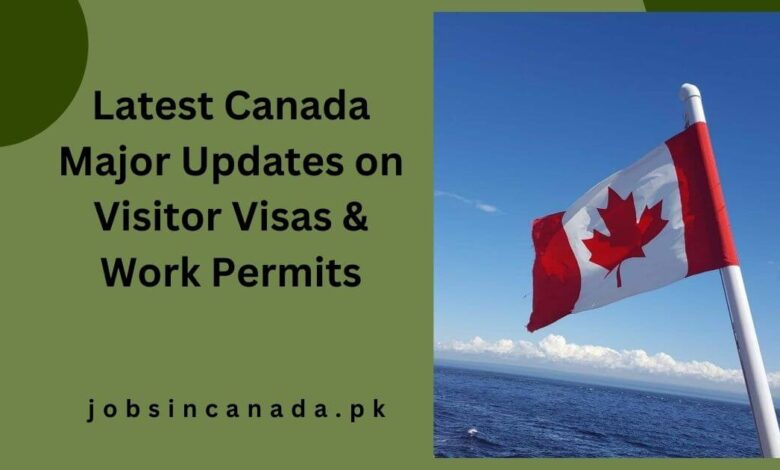Latest Canada Major Updates on Visitor Visas & Work Permits 2025

Canada has recently introduced significant updates to work permits and visitor visas that impact both international job seekers and travelers. Whether you’re planning a short visit or seeking employment opportunities, understanding these changes is essential.
This article provides accurate, up-to-date insights based on information from Immigration, Refugees, and Citizenship Canada (IRCC) and other credible sources.
Check Also: Chiropractic Receptionist Jobs in Canada – Apply Now
Processing Times for Canadian Visas:
(Study Permits, Tourist Visas & Open Work Permits)
As of February 2024, IRCC has reported extended processing times for several visa categories, particularly for applicants from India and other high-demand regions. Here’s the latest timeline:
- Visitor Visa: 20 to 25 days (previously 10 days)
- Study Permit: 7 to 8 weeks
- Open Work Permit: 20 to 25 days
- Visa Stamping: 15 to 20 days (previously 10 days)
Reasons for Delays:
According to IRCC, key factors contributing to these delays include:
- High application volumes, especially post-pandemic.
- Stricter verification procedures, sometimes outsourced to third-party agencies.
- Diplomatic tensions impacting processing efficiency in certain countries.
Despite these delays, visa approval rates remain stable. Applicants should prepare early and ensure they meet all documentation requirements to avoid additional delays.
Key Changes:
1. Post-Graduation Work Permit (PGWP) Eligibility Update
- Applicants must now demonstrate language proficiency:
- College graduates: CLB level 5 (English/French)
- University graduates: CLB level 7 (English/French)
- The goal is to streamline the transition to Permanent Residency (PR).
2. Spousal Open Work Permits
- Now restricted to highly skilled workers in sectors like healthcare, engineering, and construction.
- This policy change is expected to reduce spousal work permits by 100,000 over the next three years.
3. Reduction in Temporary Residents
- Canada aims to lower temporary residents from 6.5% to 5% of the total population under its 2025–2027 Immigration Levels Plan.
- This measure ensures a more sustainable approach to immigration.
4. PGWP Duration Adjustment
- Work permits for graduates of programs not aligned with labor shortages will be shortened.
- This could impact up to 175,000 permits over three years.
5. New Regulations on Start-Up Visa Program
- Essential applicants under the Start-Up Visa (SUV) Program can now apply for open work permits valid for up to three years.
Cost of a Work Permit in Canada:
The cost of a Canadian work permit varies depending on the type and applicant’s country of origin. Below are the general costs as per IRCC guidelines:
- Employer-Specific Work Permit: CAD $155
- Open Work Permit: CAD $255
- Biometrics Fee: CAD $85 (if required)
- Labour Market Impact Assessment (LMIA) Fees: CAD $1,000 (paid by the employer, not the worker)
Avoid Illegal Payment Requests:
- Work permits cannot be bought or sold—they are issued based on eligibility, skills, and experience.
- Some employers may charge workers illegal fees for permits—this is against Canadian law.
- Always apply through official IRCC channels or consult licensed immigration professionals.
Legal & Ethical Pathways to Work in Canada:
If you’re considering employment in Canada, legal pathways include:
- Study Permits – Many students can work part-time while studying.
- Provincial Nominee Program (PNP) – Fast-tracks workers with in-demand skills.
- Express Entry – For skilled professionals seeking permanent residency.
- Employer-Sponsored LMIA Work Permits – Requires a job offer from a Canadian employer.
Important Tip: Always consult IRCC or authorized immigration consultants before applying.
Final Thoughts:
Canada’s immigration system is evolving to balance economic needs and sustainability. While processing times have increased, visa approvals remain steady, making this an opportune time to apply if you meet the requirements.
Fraquently Asked Question:
-
What is the new news about work permits in Canada?
Government of Canada Announces Changes to Start-up Visa Work Permits. The Government of Canada has just announced dat effective October 3rd,, Start-up Visa (SUV) Program applicants who are deemed to be “essential” will now be eligible to apply for open work permits with a duration of up to three years.
-
Is Canada giving work permits to visitors?
Visitors coming to Canada can no longer apply for work permits during their stay as the federal government tightens its rules for foreign workers amid abuse concerns
-
What is the new update for the Canada visit visa 2024?
Canada’s revised visitor visa guidelines underscore the importance of individualized assessment. While officers have greater discretion in issuing single- or multiple-entry visas and determining their validity, applicants must be prepared to meet more specific criteria and provide thorough documentation.




